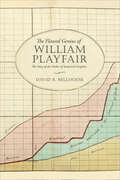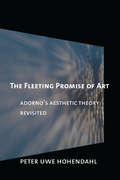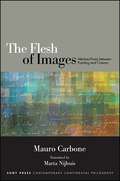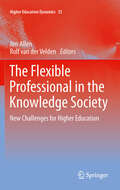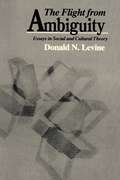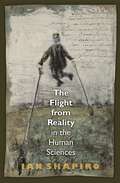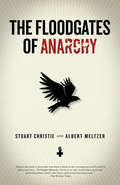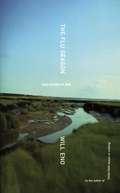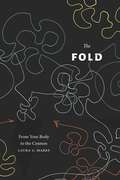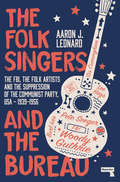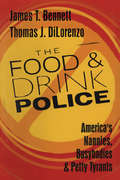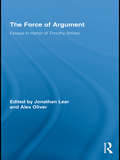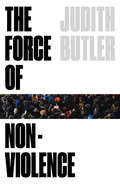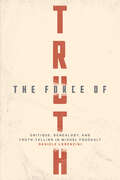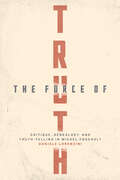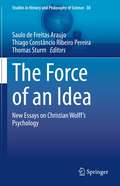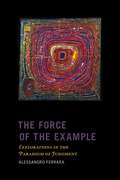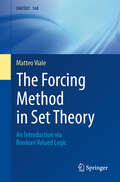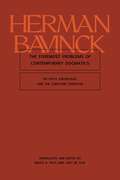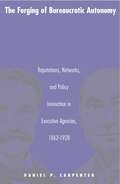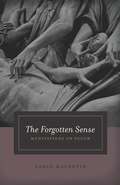- Table View
- List View
The Flawed Genius of William Playfair: The Story of the Father of Statistical Graphics
by David R. BellhouseA product of the Scottish Enlightenment, William Playfair (1759–1823) worked as a statistician, economist, engineer, banker, land speculator, scam artist, and political propagandist. It has been claimed – erroneously – that Playfair was a spy for the British government and ran a forging operation to print the paper money of the French Revolution. The Flawed Genius of William Playfair offers a complete account of Playfair’s life, richly contextualized in the economic, political, and cultural history of the French Revolution and Napoleonic Wars. The book explores the many peaks and troughs of Playfair’s career, ranging from moderate prosperity to bankruptcy and imprisonment. Through careful analysis, David R. Bellhouse shows that Playfair was neither a spy nor a forger, but perhaps briefly a one-time courier for a government minister. Bellhouse pieces together as complete a picture as possible of the forging operations supported by the British government and illuminates Playfair’s lasting contributions in economics and statistics, where he is known as the father of statistical graphics. Disputing the misinformation about the man, The Flawed Genius of William Playfair highlights that the truth about Playfair’s life is often more intriguing than the fictions that surround him.
The Fleeting Promise of Art: Adorno's Aesthetic Theory Revisited
by Peter Uwe HohendahlA discussion of Theodor Adorno s Aesthetic Theory is bound to look significantly different today than it would have looked when the book was first published in 1970, or when it first appeared in English translation in the 1980s. In The Fleeting Promise of Art, Peter Uwe Hohendahl reexamines Aesthetic Theory along with Adorno s other writings on aesthetics in light of the unexpected return of the aesthetic to today s cultural debates. Is Adorno s aesthetic theory still relevant today? Hohendahl answers this question with an emphatic yes. As he shows, a careful reading of the work exposes different questions and arguments today than it did in the past. Over the years Adorno s concern over the fate of art in a late capitalist society has met with everything from suspicion to indifference. In part this could be explained by relative unfamiliarity with the German dialectical tradition in North America. Today s debate is better informed, more multifaceted, and further removed from the immediate aftermath of the Cold War and of the shadow of postmodernism. Adorno s insistence on the radical autonomy of the artwork has much to offer contemporary discussions of art and the aesthetic in search of new responses to the pervasive effects of a neoliberal art market and culture industry. Focusing specifically on Adorno s engagement with literary works, Hohendahl shows how radically transformative Adorno s ideas have been and how thoroughly they have shaped current discussions in aesthetics. Among the topics he considers are the role of art in modernism and postmodernism, the truth claims of artworks, the function of the ugly in modern artworks, the precarious value of the literary tradition, and the surprising significance of realism for Adorno.
The Flesh of Images: Merleau-Ponty between Painting and Cinema (SUNY series in Contemporary Continental Philosophy)
by Mauro CarboneIn The Flesh of Images, Mauro Carbone begins with the point that Merleau-Ponty's often misunderstood notion of "flesh" was another way to signify what he also called "Visibility." Considering vision as creative voyance, in the visionary sense of creating as a particular presence something which, as such, had not been present before, Carbone proposes original connections between Merleau-Ponty and Paul Gauguin, and articulates his own further development of the "new idea of light" that the French philosopher was beginning to elaborate at the time of his sudden death. Carbone connects these ideas to Merleau-Ponty's continuous interest in cinema—an interest that has been traditionally neglected or circumscribed. Focusing on Merleau-Ponty's later writings, including unpublished course notes and documents not yet available in English, Carbone demonstrates both that Merleau-Ponty's interest in film was sustained and philosophically crucial, and also that his thinking provides an important resource for illuminating our contemporary relationship to images, with profound implications for the future of philosophy and aesthetics. Building on his earlier work on Marcel Proust and considering ongoing developments in optical and media technologies, Carbone adds his own philosophical insight into understanding the visual today.
The Flexible Professional in the Knowledge Society
by Rolf van der Velden Jim AllenHigher education policy has increasingly gained a European dimension, with its own distinct influence over national education policies. Against this background, a major project was launched, the REFLEX project, which aims to make a contribution to assessing the demands that the modern knowledge society places on higher education graduates, and the degree to which higher education institutions in Europe are up to the task of equipping graduates with the competencies needed to meet these demands. The project also looks at how the demands, and graduates' ability to realise them, is influenced by the way in which work is organised in firms and organisations. The REFLEX project has been carried out in sixteen different countries and consisted of a large scale survey among some 70.000 graduates. This report presents the major findings and draws important policy implications.
The Flight from Ambiguity: Essays in Social and Cultural Theory
by Donald N. LevineThe essays turn about a single theme, the loss of the capacity to deal constructively with ambiguity in the modern era. Levine offers a head-on critique of the modern compulsion to flee ambiguity. He centers his analysis on the question of what responses social scientists should adopt in the face of the inexorably ambiguous character of all natural languages. In the course of his argument, Levine presents a fresh reading of works by the classic figures of modern European and American social theory—Durkheim, Freud, Simmel and Weber, and Park, Parsons, and Merton.
The Flight from Reality in the Human Sciences
by Ian ShapiroIn this captivating yet troubling book, Ian Shapiro offers a searing indictment of many influential practices in the social sciences and humanities today. Perhaps best known for his critique of rational choice theory, Shapiro expands his purview here. In discipline after discipline, he argues, scholars have fallen prey to inward-looking myopia that results from--and perpetuates--a flight from reality. In the method-driven academic culture we inhabit, argues Shapiro, researchers too often make display and refinement of their techniques the principal scholarly activity. The result is that they lose sight of the objects of their study. Pet theories and methodological blinders lead unwelcome facts to be ignored, sometimes not even perceived. The targets of Shapiro's critique include the law and economics movement, overzealous formal and statistical modeling, various reductive theories of human behavior, misguided conceptual analysis in political theory, and the Cambridge school of intellectual history. As an alternative to all of these, Shapiro makes a compelling case for problem-driven social research, rooted in a realist philosophy of science and an antireductionist view of social explanation. In the lucid--if biting--prose for which Shapiro is renowned, he explains why this requires greater critical attention to how problems are specified than is usually undertaken. He illustrates what is at stake for the study of power, democracy, law, and ideology, as well as in normative debates over rights, justice, freedom, virtue, and community. Shapiro answers many critics of his views along the way, securing his position as one of the distinctive social and political theorists of our time.
The Floodgates of Anarchy
by Stuart Christie Albert MeltzerBack in print and featuring a new foreword by the authors, this polemic approaches the subject of anarchism in relation to class struggle. It presents an argument against class-based society and hierarchy and advocates for a free and equal society based on individual dignity and merit. Drawing from the authors' experiences as activists and documenting the activities of other 20th-century anarchists—including clandestine activities and social change by any means—this fundamental text asserts that government is the true enemy of the people and that only through the dissolution of government can the people put an end to exploitation and war, leading to a fully free society.
The Flu Season and Other Plays
by Will Eno"Will Eno is one of the finest younger playwrights I have come across in a number of years. His work is inventive, disciplined and, at the same time, wild and evocative. His ear is splendid and his mind is agile."--Edward Albee "An original, a maverick wordsmith whose weird, wry dramas gurgle with the grim humor and pain of life. Eno specializes in the connections of the unconnected, the apologetic murmurings of the disengaged."--Guardian Winner of the 2004 Oppenheimer Award for best New York debut by an American playwright, The Flu Season is a reluctant love story, in spite of itself. Set in a hospital and a theater, it is a play that revels in ambivalence and derives a flailing energy from its doubts whether a love story is ever really a love story. Will Eno has been called "a Samuel Beckett for the Jon Stewart generation" (The New York Times)--he is a playwright with an extraordinary voice and a singular theatrical vision. Also included in this volume are Tragedy: A Tragedy and Intermission.
The Fold: From Your Body to the Cosmos
by Laura U. MarksIn The Fold, Laura U. Marks offers a practical philosophy and aesthetic theory for living in an infinitely connected cosmos. Drawing on the theories of Leibniz, Glissant, Deleuze, and theoretical physicist David Bohm—who each conceive of the universe as being folded in on itself in myriad ways—Marks contends that the folds of the cosmos are entirely constituted of living beings. From humans to sandwiches to software to stars, every entity is alive and occupies its own private enclosure inside the cosmos. Through analyses of fiction, documentary and experimental movies, interactive media, and everyday situations, Marks outlines embodied methods for detecting and augmenting the connections between each living entity and the cosmos. She shows that by affectively mediating with the ever-shifting folded relations within the cosmos, it is possible to build “soul-assemblages” that challenge information capitalism, colonialism, and other power structures and develop new connections with the infinite. With this guide for living within the enfolded and unfolding cosmos, Marks teaches readers to richly apprehend the world and to trace the processes of becoming that are immanent within the fold.
The Folk Singers and the Bureau: The FBI, the Folk Artists and the Suppression of the Communist Party, USA-1939-1956
by Aaron LeonardThe first book to document the efforts of the FBI against the most famous American folk singers of the mid-twentieth century, including Woody Guthrie, 'Sis Cunningham, Pete Seeger, Lee Hays and Burl Ives.Some of the most prominent folk singers of the twentieth century, including Woody Guthrie, 'Sis Cunningham, Pete Seeger, Lee Hays, Burl Ives, etc., were also political activists with various associations with the American Communist Party. As a consequence, the FBI, along with other governmental and right-wing organizations, were monitoring them, keeping meticulous files running many thousands of pages, and making (and carrying out) plans to purge them from the cultural realm.In The Folk Singers and the Bureau, Aaron J Leonard draws on an unprecedented array of declassified documents and never before released files to shed light on the interplay between left-wing folk artists and their relationship with the American Communist Party, and how it put them in the US government's repressive cross hairs.At a time of increasing state surveillance and repression, The Folk Singers and the Bureau shows how the FBI and other governmental agencies have attempted to shape and repress American culture.
The Food and Drink Police: America's Nannies, Busybodies and Petty Tyrants
by Thomas DiLorenzoWritten in a lively, engaging style, The Food and Drink Police is a thoroughgoing examination and critique of the efforts of government agencies and private organizations (including the Center for Science in the Public Interest, Mothers Against Drunk Driving, the Bureau of Alcohol, Tobacco and Firearms, and the Food and Drug Administration) to regulate the dietary habits and choices of private citizens. Irreverent, yet always informed, the authors analyze the ideological motivations, spurious science, and assaults on freedom that underlie the activities of these groups. General readers, nutritionists and scientists in general, doctors, and government policymakers will find this indispensable reading. Chapters such as "Eat, Drink, and Keel Over: Lasagna, Egg Rolls, and Popcorn Can Kill" discuss the "evils" of multicultural cuisine and coffee, and the "good news" about junk food. In "care for a Drink?" and "None for the Road" the authors provide an in-depth look at Prohibition 1990s-style; "Glow-in-the-Dark Eggs or Anal Leakage: Pick Your Poison" provocatively fuels the current debate on fake fats and irradiated beef.In The Pleasure Police, David Shaw quotes the psychologist and advocate of "defensive" eating, Dr. Stephen Gullo, as advising his thin-obsessed patients to "drink tomato juice before ordering" in restaurants; tomato juice, after al, is "a natural appetite suppressant." To which Shaw adds, "I assume he also advises his clients to masturbate before making love." James T. Bennett and Thomas J. DiLorenzo expose this sort of convoluted advice in The Food and Drink Police, a timely and important contribution to the cultural debate on government and private choice.
The Force of Argument: Essays in Honor of Timothy Smiley
by Jonathan Lear Alex OliverTimothy Smiley has made ground-breaking contributions to modal logic, free logic, multiple-conclusion logic, and plural logic; he has illuminated Aristotle’s syllogistic, the ideas of logical form and consequence, and the distinction between assertion and rejection; and his debunking work on the theory of descriptions is a tour de force. In this volume, an international roster of contributors discuss Smiley's work to date; their essays will be of significant interest to those working across the logical spectrum—in philosophy of language, philosophical logic and mathematical logic.
The Force of Nonviolence: The Ethical in the Political
by Judith Butler&“Judith Butler is the most creative and courageous social theorist writing today." – Cornel West&“Judith Butler is quite simply one of the most probing, challenging, and influential thinkers of our time.&” – J. M. BernsteinJudith Butler&’s new book shows how an ethic of nonviolence must be connected to a broader political struggle for social equality. Further, it argues that nonviolence is often misunderstood as a passive practice that emanates from a calm region of the soul, or as an individualist ethical relation to existing forms of power. But, in fact, nonviolence is an ethical position found in the midst of the political field. An aggressive form of nonviolence accepts that hostility is part of our psychic constitution, but values ambivalence as a way of checking the conversion of aggression into violence. One contemporary challenge to a politics of nonviolence points out that there is a difference of opinion on what counts as violence and nonviolence. The distinction between them can be mobilized in the service of ratifying the state&’s monopoly on violence. Considering nonviolence as an ethical problem within a political philosophy requires a critique of individualism as well as an understanding of the psychosocial dimensions of violence. Butler draws upon Foucault, Fanon, Freud, and Benjamin to consider how the interdiction against violence fails to include lives regarded as ungrievable. By considering how &“racial phantasms&” inform justifications of state and administrative violence, Butler tracks how violence is often attributed to those who are most severely exposed to its lethal effects. The struggle for nonviolence is found in movements for social transformation that reframe the grievability of lives in light of social equality and whose ethical claims follow from an insight into the interdependency of life as the basis of social and political equality.
The Force of Truth: Critique, Genealogy, and Truth-Telling in Michel Foucault
by Daniele LorenziniA groundbreaking examination of Michel Foucault's history of truth. Many blame Michel Foucault for our post-truth and conspiracy-laden society. In this provocative work, Daniele Lorenzini argues that such criticism fundamentally misunderstands the philosopher’s project. Foucault did not question truth itself but what Lorenzini calls “the force of truth,” or how some truth claims are given the power to govern our conduct while others are not. This interest, Lorenzini shows, drove Foucault to articulate a new ethics and politics of truth-telling precisely in order to evade the threat of relativism. The Force of Truth explores this neglected dimension of Foucault’s project by putting his writings on regimes of truth and parrhesia in conversation with early analytic philosophy and by drawing out the “possibilizing” elements of Foucault’s genealogies that remain vital for practicing critique today.
The Force of Truth: Critique, Genealogy, and Truth-Telling in Michel Foucault
by Daniele LorenziniA groundbreaking examination of Michel Foucault's history of truth. Many blame Michel Foucault for our post-truth and conspiracy-laden society. In this provocative work, Daniele Lorenzini argues that such criticism fundamentally misunderstands the philosopher’s project. Foucault did not question truth itself but what Lorenzini calls “the force of truth,” or how some truth claims are given the power to govern our conduct while others are not. This interest, Lorenzini shows, drove Foucault to articulate a new ethics and politics of truth-telling precisely in order to evade the threat of relativism. The Force of Truth explores this neglected dimension of Foucault’s project by putting his writings on regimes of truth and parrhesia in conversation with early analytic philosophy and by drawing out the “possibilizing” elements of Foucault’s genealogies that remain vital for practicing critique today.
The Force of an Idea: New Essays on Christian Wolff's Psychology (Studies in History and Philosophy of Science #50)
by Thomas Sturm Saulo de Freitas Araujo Thiago Constâncio Ribeiro PereiraThis book presents, for the first time in English, a comprehensive anthology of essays on Christian Wolff's psychology written by leading international scholars. Christian Wolff is one of the towering figures in 18th-century Western thought. In the last decades, the publication of Wolff's Gesammelte Werke by Jean École and collaborators has aroused new interest in his ideas, but the meaning, scope, and impact of his psychological program have remained open to close and comprehensive analysis and discussion. That is what this volume aims to do. This is the first volume in English completely devoted to Wolff's efforts to systematize empirical and rational psychology, against the background of his understanding of scientific method in metaphysics. Wolff thereby paved the way to the very idea of a scientific psychology. The book is divided into two parts. The first one covers the theoretical and historical meaning and scope of Wolff's psychology, both in its internal structure and in its relation to other parts of his philosophical system, such as logic, cosmology, aesthetics, or practical philosophy. The second part deals with the reception and impact of Wolff's psychology, starting with early reactions from his disciples and opponents, and moving on to Kant, Hegel, and Wundt. The Force of an Idea: New Essays on Christian Wolff's Psychology shows not only that Wolff's psychological ideas have been misinterpreted, but also that they are historically more significant than traditional wisdom has it. The book, therefore, will be of interest to historians and philosophers of science, historians of philosophy and psychology, as well as to philosophers and psychologists interested in understanding the roots of scientific psychology in 18th and 19th century German philosophy.
The Force of the Example: Explorations in the Paradigm of Judgment
by Alessandro FerraraDuring the twentieth century, the view that assertions and norms are valid insofar as they respond to principles independent of all local and temporal contexts came under attack from two perspectives: the partiality of translation and the intersubjective constitution of the self, understood as responsive to recognition. Defenses of universalism have by and large taken the form of a thinning out of substantive universalism into various forms of proceduralism. Alessandro Ferrara instead launches an entirely different strategy for transcending the particularity of context without contradicting our pluralistic intuitions: a strategy centered on the exemplary universalism of judgment. Whereas exemplarity has long been thought to belong to the domain of aesthetics, this book explores the other uses to which it can be put in our philosophical predicament, especially in the field of politics. After defining exemplarity and describing how something unique can possess universal significance, Ferrara addresses the force exerted by exemplarity, the nature of the judgment that discloses exemplarity, and the way in which the force of the example can bridge the difference between various contexts. Drawing not only on Kant's Critique of the Power of Judgment but also on the work of Hannah Arendt, John Rawls, Ronald Dworkin, and Jürgen Habermas, Ferrara outlines a view of exemplary validity that is applicable to today's central philosophical issues, including public reason, human rights, radical evil, sovereignty, republicanism and liberalism, and religion in the public sphere.
The Force of the Example: Explorations in the Paradigm of Judgment (New Directions in Critical Theory #38)
by Alessandro FerraraDuring the twentieth century, the view that assertions and norms are valid insofar as they respond to principles independent of all local and temporal contexts came under attack from two perspectives: the partiality of translation and the intersubjective constitution of the self, understood as responsive to recognition. Defenses of universalism have by and large taken the form of a thinning out of substantive universalism into various forms of proceduralism. Alessandro Ferrara instead launches an entirely different strategy for transcending the particularity of context without contradicting our pluralistic intuitions: a strategy centered on the exemplary universalism of judgment. Whereas exemplarity has long been thought to belong to the domain of aesthetics, this book explores the other uses to which it can be put in our philosophical predicament, especially in the field of politics. After defining exemplarity and describing how something unique can possess universal significance, Ferrara addresses the force exerted by exemplarity, the nature of the judgment that discloses exemplarity, and the way in which the force of the example can bridge the difference between various contexts. Drawing not only on Kant's Critique of the Power of Judgment but also on the work of Hannah Arendt, John Rawls, Ronald Dworkin, and Jürgen Habermas, Ferrara outlines a view of exemplary validity that is applicable to today's central philosophical issues, including public reason, human rights, radical evil, sovereignty, republicanism and liberalism, and religion in the public sphere.
The Force of the Virtual: Deleuze, Science, and Philosophy
by Peter GaffneyGilles Deleuze once claimed that &‘modern science has not found its metaphysics, the metaphysics it needs.&’ The Force of the Virtual responds to this need by investigating the consequences of the philosopher&’s interest in (and appeal to) &‘the exact sciences.&’ In exploring the problematic relationship between the philosophy of Deleuze and science, the original essays gathered here examine how science functions in respect to Deleuze&’s concepts of time and space, how science accounts for processes of qualitative change, how science actively participates in the production of subjectivity, and how Deleuze&’s thinking engages neuroscience.All of the essays work through Deleuze&’s understanding of the virtual—a force of qualitative change that is ontologically primary to the exact, measurable relations that can be found in and among the objects of science. By adopting such a methodology, this collection generates significant new insights, especially regarding the notion of scientific laws, and compels the rethinking of such ideas as reproducibility, the unity of science, and the scientific observer.Contributors: Manola Antonioli, Collège International de Philosophie (Paris); Clark Bailey; Rosi Braidotti, Utrecht U; Manuel DeLanda, U of Pennsylvania; Aden Evens, Dartmouth U; Gregory Flaxman, U of North Carolina; Thomas Kelso; Andrew Murphie, U of New South Wales; Patricia Pisters, U of Amsterdam; Arkady Plotnitsky, Purdue U; Steven Shaviro, Wayne State U; Arnaud Villani, Première Supérieure au Lycée Masséna de Nice.
The Forcing Method in Set Theory: An Introduction via Boolean Valued Logic (UNITEXT #168)
by Matteo VialeThe main aim of this book is to provide a compact self-contained presentation of the forcing technique devised by Cohen to establish the independence of the continuum hypothesis from the axioms of set theory. The book follows the approach to the forcing technique via Boolean valued semantics independently introduced by Vopenka and Scott/Solovay; it develops out of notes I prepared for several master courses on this and related topics and aims to provide an alternative (and more compact) account of this topic with respect to the available classical textbooks. The aim of the book is to take up a reader with familiarity with logic and set theory at the level of an undergraduate course on both topics (e.g., familiar with most of the content of introductory books on first-order logic and set theory) and bring her/him to page with the use of the forcing method to produce independence (or undecidability results) in mathematics. Familiarity of the reader with general topology would also be quite helpful; however, the book provides a compact account of all the needed results on this matter. Furthermore, the book is organized in such a way that many of its parts can also be read by scholars with almost no familiarity with first-order logic and/or set theory. The book presents the forcing method outlining, in many situations, the intersections of set theory and logic with other mathematical domains. My hope is that this book can be appreciated by scholars in set theory and by readers with a mindset oriented towards areas of mathematics other than logic and a keen interest in the foundations of mathematics.
The Foreign Policy of the Russian Federation: Implications for Black Sea Security
by Olga R. ChiriacThis distinctive book deconstructs the foundational elements of Russian foreign policy from a Russian perspective and with references to Russian sources, rather than the typical Western perspective. The author Olga Raluca Chiriac situates her work at the intersection of strategic studies and cognitive psychology, offering an analysis that goes deep into the roots of Russian strategic behavior, especially socio-cultural elements such as attitudes towards the West, language, culture. She highlights Russia’s unique decision-making process, sometimes overt and other times covert. The book aims to present a mechanism for analysis in both strategic choices and foreign policy, but it also points out that countries and nations are complicated entities, all having a particular historical experience, generational trauma, culture and traditions.
The Foremost Problems of Contemporary Dogmatics: On Faith, Knowledge, and the Christian Tradition
by Herman BavinckHerman Bavinck on the challenges theologians face Herman Bavinck's counsel to theologians A unique window into Bavinck's thought An overlooked work from a key Neo-Calvinist thinker In The Foremost Problems of Contemporary Dogmatics, Herman Bavinck identifies the primary challenges confronting Protestant theologians in the early twentieth century. Since the main difficulties do not concern specific heads of doctrine but arise in theological method, Bavinck's focus narrows to the act of faith. Bavinck demonstrates the necessity of viewing faith as knowledge rather than mere trust, recounting the development of doctrine from the biblical authors through the dawn of the twentieth century. This book provides a unique window into Bavinck's thought, as he speaks candidly about the limitations and failures of Reformed theology and the relative merits of modern thinkers. The Foremost Problems of Contemporary Dogmatics was a series of lectures delivered at the Free University shortly after Bavinck moved to Amsterdam in 1902. Edited and translated by Gert de Kok and Bruce R. Pass, these previously unpublished lectures are available for the first time in English.
The Forging of Bureaucratic Autonomy: Reputations, Networks, and Policy Innovation in Executive Agencies, 1862-1928 (Princeton Studies in American Politics: Historical, International, and Comparative Perspectives #173)
by Daniel CarpenterUntil now political scientists have devoted little attention to the origins of American bureaucracy and the relationship between bureaucratic and interest group politics. In this pioneering book, Daniel Carpenter contributes to our understanding of institutions by presenting a unified study of bureaucratic autonomy in democratic regimes. He focuses on the emergence of bureaucratic policy innovation in the United States during the Progressive Era, asking why the Post Office Department and the Department of Agriculture became politically independent authors of new policy and why the Interior Department did not. To explain these developments, Carpenter offers a new theory of bureaucratic autonomy grounded in organization theory, rational choice models, and network concepts. According to the author, bureaucracies with unique goals achieve autonomy when their middle-level officials establish reputations among diverse coalitions for effectively providing unique services. These coalitions enable agencies to resist political control and make it costly for politicians to ignore the agencies' ideas. Carpenter assesses his argument through a highly innovative combination of historical narratives, statistical analyses, counterfactuals, and carefully structured policy comparisons. Along the way, he reinterprets the rise of national food and drug regulation, Comstockery and the Progressive anti-vice movement, the emergence of American conservation policy, the ascent of the farm lobby, the creation of postal savings banks and free rural mail delivery, and even the congressional Cannon Revolt of 1910.
The Forgiveness to Come: The Holocaust and the Hyper-Ethical (Just Ideas)
by Peter Jason BankiThis book is concerned with the aporias, or impasses, of forgiveness, especially in relation to the legacy of the crimes against humanity perpetrated by the Nazis and their collaborators during World War II. Banki argues that, while forgiveness of the Holocaust is and will remain impossible, we cannot rest upon that impossibility. Rather, the impossibility of forgiveness must be thought in another way. In an epoch of “worldwidization,” we may not be able simply to escape the violence of scenes and rhetoric that repeatedly portray apology, reconciliation, and forgiveness as accomplishable acts. Accompanied by Jacques Derrida’s thought of forgiveness of the unforgivable, and its elaboration in relation to crimes against humanity, the book undertakes close readings of literary, philosophical, and cinematic texts by Simon Wiesenthal, Jean Améry, Vladimir Jankélévitch, Robert Antelme and Eva Mozes Kor. These texts contend with the idea that the crimes of the Nazis are inexpiable, that they lie beyond any possible atonement or repair. Banki argues that the juridical concept of crimes against humanity calls for a thought of forgiveness—one that would not imply closure of the infinite wounds of the past. How could such a forgiveness be thought or dreamed? Banki shows that if today we cannot simply escape the “worldwidization” of forgiveness, then it is necessary to rethink what forgiveness is, the conditions under which it supposedly takes place, and especially its relation to justice.
The Forgotten Sense: Meditations on Touch
by Pablo MauretteOf all the senses, touch is the most ineffable—and the most neglected in Western culture, all but ignored by philosophers and artists over millennia. Yet it is also the sense that links us most intimately to the world around us, from our mother’s caress when we’re born to the gentle lowering of our eyelids after death. The Forgotten Sense gives touch its due, addressing it in multifarious ways through a series of six essays. Literary in feel, ambitious in conception, admirable in their range of reference and insight, these meditations address questions fundamental to the understanding of touch: What do we mean when we say that an artwork touches us? How does language affect our understanding of touch? Is the skin the deepest part of the human body? Can we philosophize about a kiss? To aid him in answering these questions, Pablo Maurette recruits an impressive roster of cultural figures from throughout history: Homer, Lucretius, Chrétien de Troyes, Melville, Sir Thomas Browne, Knausgaard, Michel Henry and many others help him unfurl the underestimated importance of the sense of touch and tactile experience. The resulting book is essay writing at its best—exploratory, surprising, dazzling, a reading experience like no other. You will come away from it with a new appreciation of touch, and a new way of understanding our interactions with the world around us.
